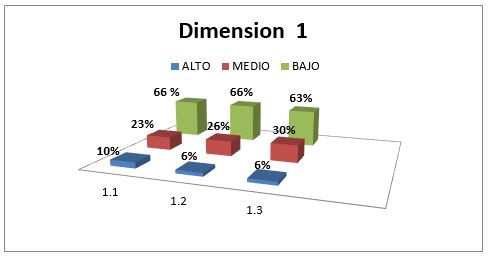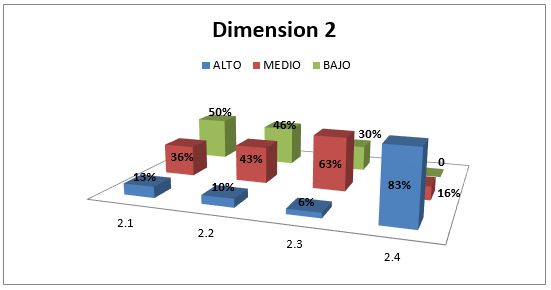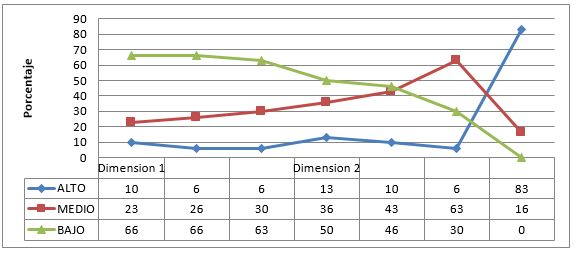Current State of the Improvement of the Comprehensive General Physician on Chronic Kidney Disease Sharpened in the Elderly
Junys Ramos Vázquez*, Maely Ramírez Rodríguez, Medardo Rodríguez López, Vida de Vázquez Borrego Ramos
Medical. First Degree Specialist in Integral General Medicine and Nephrology, General Teaching Hospital “Abel Santamaría Cuadrado”, Cuba
Nursing Degree. PhD in Health Sciences, University of Medical Sciences of Pinar del Río, Cuba.
PhD in Pedagogical Sciences. Hospital “Abel SantamaríaCuadrado”, cuba
First-year medical student, Faculty of Medical Sciences Eernesto Che Guevara de la Serna ‘University of Medical Sciences of Pinar del Río, Cuba.
Received Date: 31/03/2021; Published Date: 13/04/2021
*Corresponding author: Junys Ramos Vázquez, Medical, First Degree Specialist in Integral General Medicine and Nephrology, Assistant Professor, General Teaching Hospital “Abel Santamaría Cuadrado”, Pinar del Río, Cuba. Email: junys@infomed.sld.cu, ORCID: https://orcid.org/0000-0002-4383-6655
Summary
Introduction: Care for elderly patients with acute chronic kidney disease is a common cause of consultation in primary health care, which is a challenge for the comprehensive general physician.
Objective: (c) to arachterize the current state of professional improvement of the comprehensive general physician on chronic kidney disease sharpened in theelderly.
Method: thesystem ofmethods used integrated theoretical, empirical and statistical methods, the information was processed in a microcomputer and the results were carried out to charts and graphs for better study and understanding.
Results: prior to the emergence of the comprehensive general physician's program, professional improvement activities were provided sporadically alternating with periods of increase but in a non-systemic way, professional improvement over chronic renal disease sharpened in the elderly for the comprehensive general doctor is insufficient, mainly related to the mastery of knowledge; there are currently the human and material resources necessary to reverse this situation.
Conclusions: Professional improvement in care for the elderly patient with chronic kidney disease exacerbated in primary health care is important to achieve quality in the care of excellence to this population group.
Keywords: Superation; Primary health care; Cronic kidney disease; Elders
Introduction
Kidney disease is among the many major public health disorders related to noncommunicable diseases, pose a major threat to health and development globally, causing the need under the World Health Organization (WHO) to increase the funding, recruitment, improvement and training of health workers; reflected in the 2030 Agenda and the Sustainable Development Goals [1,2].
The professional improvement of the comprehensive general physician (MGI) working in primary health care (APS) base of the National Health System (SNS) is strategic of its permanent improvement to address these incident problems in the population, even more in the aging; the quality of health care as well as lower health care costs will depend, avoiding unfavorable social and health consequences [1,3,4].
In Cuba, SNS provides specific attention to problems related to diseased kidneys and aging; the existence of the National Chronic Kidney Disease Prevention Program and Older Adult Program demonstrate this. The MGI of the APS should be able to provide comprehensive medical care to all population groups but the elderly constitutes an extremely vulnerable group [5,6].
One of the conditions that is often confronted by SDAMGI is chronic renal disease exacerbated in the elderly patient (ERCAA), as the main cause is the conditioning of a previous diagnosis of Chronic Kidney Disease (CKD), decompensation of underlying diseases, the association of tables associated with volume deficit and drug toxicity among another [7,8] the early identification of morbidities by the MGI of the APS is a challenge; early identification of noxas actuation an aged kidney, addressing elderly patients with different morbidities become a key point in the medical care offered by these galleons, making the difference between continuing to live with compensated chronic diseases without impact on quality of life, entering treatment methods of renal function or dying.
In improving the technical scientifically based diagnostic capacity coupled with the strengthening of values should be the action of the MGI of the APS, complying with this satisfies the need for continuous professional improvement capable of guaranteeing an efficient and human health service.
The article is the result of the research work that was carried out as part of the master's degree in Higher Medical Education from the University Medical Sciences of Pinar del Río and aims to characterize the current state of professional improvement of the integral general practitioner on chronic kidney disease sharpened in the elderly’s.
Method
A descriptive, cross-cutting research was carried out in the field of postgraduate education, with the objective of characterizing the current state of professional improvement of the comprehensive general doctor on chronic renal disease agudizada in the municipality of Los Palacios, during the first quarter of 2019. The system of methods was used, which were both theoretical, empirical and statistical processing; was used the observation of inter consult as performed by the MGI in the specialty of nephrology in the municipality of Los Palacios, as well as the analysis of outpatient medical records of patients served in consultation, in addition to the professional postgraduate improvement plan of the University of Medical Sciences of Pinar del Río. The interview was used for management and the survey for MGI; (i)the processing of the information was carried out through the descriptive Estadística.
The population covered 30 comprehensive general doctors working in primary health care belonging to basic working groups number 2 and basic groupnumber3 belonging to the municipality of Los Palacios. The study variable was the process of professional improvement of the comprehensive general physician of primary health care on chronic renal disease sharpened in the elderly and was operationalized in dimensions and indicators. Two dimensions were considered: cognitive-procedural and methodological. Similarly, the two dimensions were conceptualized, hence the determining of their indicators.
Dimension 1. Cognitive-procedural
Definition: Mastery of knowledge about chronic kidney disease sharpened in the elderly in the SDA belonging to the municipality Los Palacios.
Indicators:
1.1 Domain level on the concept and classification of CKD and ERCA of the general physician integrates from the APS.
1.2. Level of identification risk factors of the ERCAA.
1.3. Level of relationship between diagnosis and treatment pillars of ERCAA.
Dimension 2. Methodological
Definition: Quality actions of the professional improvement process on chronic renal disease sharpened in the elderly that allow the integration of the contents for the comprehensive general doctor of the APS.
Indicators:
2.1. Level of variety of ways of overcoming in relation to the ERCAA theme
2.2. Level of implementation of planned actions to overcome ERCAA
2.3. Level of update of the professional who gave the actions of improvement over ERCAA.
2.4. Level of relevance of ERCAA overcoming actions for primary health care.
The scale for assessing the achievement of indicators, dimensions and variable is expressed in the ranges: high (A), medium (M), and low (B).
Results
The interview with management staff yielded the following results: 100% raise the need to plan and execute professional improvement actions on acute chronic kidney disease in the elderly, deny receiving training courses on the subject in the last 3 years and mostly refer to the latter being conducted more than 10 years ago and were not suitable for the SDP.
There is consensus on the importance of the level of updating of the specialist who teaches the subject, 100% expressed it, as well as the need to carry out professional improvement actions for the integral general doctor due to the confrontation of an aging population with abundant basic diseases that alone, can already affect the aged kidney.
Similarly, managers considered it important to ensure the overcoming of renal physicians for the elderly patient; and also integrate the mastery of the concept, classifications, risk, diagnosis and behavior to follow in this population group.
Observation to APS MGI during the nephrology inter consultation was reported in 23 consultations with all 30 physicians and covered the analysis of various patient stories. Existing difficulty in classifying the CKD stage of the elderly patient, risk stratification, identified inadequacies related to the mastery of formula management to calculate the glomerular filtration rate for the elderly patient.
Analyzing physician surveys, it was obtained that the level of knowledge on the CKD and ERCA level of CKD and ERCA of the APS physician was low with 66%, coinciding with the level of identification risk factors of ERCAA for 66% equally and 63% for the level of relationship between diagnosis and treatment pillars of ERCAA, and also being evaluated as low. Overall, the cognitive-procedural dimension was in a low range. (Gof ico.1)

Figure 1: Evaluation of cognitive-procedural dimension.

Chart 2: Evaluation of the methodological dimension.
The analysis of the postgraduate projection in chronic renal disease sharpened in the elderly, made it possible to verify that there were no registered or accredited overcoming activities in recent years.

Figure 3: Evaluation of cognitive-procedural dimension and methodological dimension.
Doctors agreed with managers to recognize the need for improvement in acute chronic kidney disease in the elderly, requested access to frequent updates on these issues and are also appropriate to primary health care, as well as the level of updating of the staff who provide these updates. The methodological dimension of the variable, taking into account its four indicators, showed that the level of variety of ways of overcoming in relation to the ERCAA topic was low for 50% and the level of execution of planned actions of improvement over ERCAA 43% being both in the predominant low range, while the level of updating of the professional who delivered the actions of overcoming over ERCAA was evaluated in a mid-range for 63% and the level of relevance of the actions of overcoming over ERCAA for primary health care was in a high range with 83%,but overall the dimension was evaluated in a low range.( Record.2)
Discussion
Professional improvement in the context of medical education is an important way in the development of knowledge and skills of health professionals [9]. En Cuba the comprehensive general physician, in binomial with his nurses, constitutes the basis of the APS, as the axis of health systems, based on an increase in effectiveness and efficiency; according to Giraldo Osorio A [10], providing health systems with trained human resources capable of performing APS functions is a challenge, the solution of a globalized world, innovations in science and technology, the emergence and development of computing, old and new diseases, are part of the realities that must face the professional improvement of the comprehensive general doctor.
Varied are the definitions of professional improvement, Añórga Morales J [11] defines it as: "figure aimed at various processes of labor resources, with the purpose of updating and improving current and perspective professional performance, addressing training inadequacies, or completing knowledge and skills not previously acquired and necessary for performance".
In Cuba, multiple studies have addressed the professional improvement of the comprehensive and diverse general physician have been topics [9,12-14], specifically on renal issues for APS, which is referred to in the bibliography since the1980swere already published, even before the creation of the Doctor and Nurse the Family Program, it was originally aimed at doctors who trained in community polyclinics, but it was sporadically; since then, researchers were demonstrating on the subject and reflecting the need to overcome these APS professionals on kidney issues, in order to offer better quality in medical care [7,8,15].
With the consolidation of Integral General Medicine as a specialty, conditions were already created to advance the overcoming of kidney issues in the SPO. (I) prior to the emergence of the Ren al Chronicle National Disease Prevention Program; in 1996 as demonstrated by Drs. Almaguer M and Valdivia JC 16, showed how from the APS, the confrontation with this problem was more effective, however, it is not until the 1990sthat the importance of APS in kidney issues began to be visualized, and during the years 1994-1995 a series of professional improvement courses in kidney issues for family doctors are held, that were part of a preventive nephrology program at the primary level of health that were occasionally taught throughout the country [5,7,8,15].
Interesting to note that Pinar del Rio was a pioneer in the realization of professional improvement to that directed at the MGI in the APS, the study Application of a program of nephrology for reventive at the primary level, carried out by a group of nephrologists [15], carried out in several municipalities of the province possible the access of several integral general doctors of those municipalities to professional improvement in renal health issues.
After that date, professional improvement in renal issues in Pinar del Rio has been mainly directed in the development of isolated postgraduate courses and lacking totally improvement in chronic renal disease sharpened in ancianos, as shown by the analysis of the postgraduate improvement plan; in professional improvement in chronic kidney disease sharpened in the elderly for MGI, it was found that there have been no recorded or recorded activities in recent years [17].
Training towards the SDA is being demanded around the world to address the new health conditions: chronicity, multipathology, dependence, need for efficiency and resolution in the face of the economic crisis combined with an increased elderly population.
Conclusion
In the current context, kidney diseases linked to aging demand a permanent improvement for comprehensive general doctors of the APS, in Cuba, the theme has developed sporadically, with Pinar del Río being a pioneer in the studies in this regard, however there are still deficiencies related to professional improvement.
The evaluation of professional improvement on acute chronic kidney disease in the elderly of the comprehensive general physician in the SDP is insufficient, both in quantity and quality, and the low level of knowledges on chronic renal disease sharpened in the elderly for primary health care is manifested.
The comprehensive general doctor is ended with a modified reality, two major epidemics are combined that he must face with solid knowledge continuously updated: chronic kidney disease and aging or; in overcoming is the key to success; offer optimal care capable of satisfying a well-deserved specied life to our elders.
References
- WHO. It's time to act. Report of the WHO High-Level Independent Commission on Noncommunicable Diseases.
- López Espinosa GJ, Lemus Lago ER, Cañizares Luna O, Valdés Mora M. Professional improvement in occupational health as a necessity for comprehensive health care. Higher Medical Education [Internet]. 2017; 31(2): [approx. 0 p].
- Alvarez de Zayas, C.M. Didactic: The School in Life. 3rd edition. Havana: Editorial Pueblo y Education, Cuba; 1999.
- Manzo Rodríguez Lidia, Rivera Michelena C. Natacha, Rodríguez Orozco Alain R. Graduate education and its impact on the training of the Ibero-American professional. EducMedSuper [Internet]. 2006; 20(3).
- Cuba. Ministry of Public Health. Chronic Kidney Failure Prevention Program. Havana: MINSAP; 1996.
- Cuba, Ministry of Public Health. Older Adult Program. Havana: MINSAP; 1996.
- Alfonso Guerra JP. nephrology. Havana: Editorial Medical Sciences; 2016.
- Gutierrez Gutierrez C. Kidney and aging. Havana: Scientific -Technical Editorial; 2011. P.76-79.
- Cardentey García Juan, González Rodríguez Raidel. Aspects about professional improvement in medical education. EducMedSuper [Internet]. 2016; 30(1).
- Giraldo Osorio Alexandra, Vélez Alvarez Consuelo. Challenges in training human talent for primary health care in Latin America. Public Health Rev. [Internet]. 2016; 25(2): 54-70.
- Añorga Morales JA. Glossary of Terms of Advanced Education. 3rd ed. Havana, Cuba: ISPEJV; 2010.
- Igarza Milian GM, González Ortega AM. Learning needs in Caumatology of the integral general doctor from the primary level of health. Rev Medical Sciences. 2018; 22(3).
- Pérez González H, Corrales Negrin Y. Professional performance and improvement in the management of ophthalmological emergencies in primary health care. Journal of Medical Sciences of Pinar del Río, [S.l.], 2016; 20(1): p. 114-120.
- Díaz Alfonso H, Padrón González O, Lorenzo Díaz JC. Human leptospirosis: a strategy of overcoming. Journal of Medical Sciences of Pinar del Río, [S.l.], 2017; 22(1): p. 133-141.
- Gutierrez C, Soto L, Herrera R, Almaguer M. Implementation of a preventive nephrology program at the primary level. VII Latin American Congress of Organ and Tissue Transplants. Havana: Convention Palace; 1995. pp. 142-43.
- RISK FACTORS FOR SURVIVAL IN CHRONIC RENAL PATIENTS IN HAEMODIALYSIS AND RENAL TRANSPLANTATION. CIMEQ. 1995-2004. Thesis to opt for the scientific degree of Doctor of Medical Sciences. Dr. Julio Valdivia Arancibia
- University of Medical Sciences of Pinar del Rio. Academic Vice-Chancellor. Graduate-Research Directorate. Provincial Plan of Professional Improvement. 2017-2018. Pinar del Rio: UCMPR; 2018.

